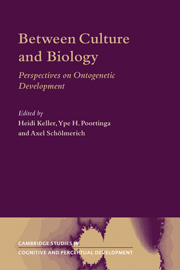Book contents
- Frontmatter
- Contents
- List of figures
- List of tables
- Notes on contributors
- Acknowledgements
- Introduction
- Part I Setting the scene
- Part II Perspectives on development informed by culture
- 4 Indian parents' ethnotheories as reflections of the Hindu scheme of child and human development
- 5 Indigenous conceptions of childhood development and social realities in southern Africa
- 6 The myth of lurking chaos
- 7 Integrating cultural, psychological and biological perspectives in understanding child development
- Part III Perspectives on development drawing from the universal and the specific
- Part IV Perspectives on development informed by evolutionary thinking
- Part V Metaperspectives
- Author index
- Subject index
- Cambridge Cultural Social Studies
6 - The myth of lurking chaos
Published online by Cambridge University Press: 22 September 2009
- Frontmatter
- Contents
- List of figures
- List of tables
- Notes on contributors
- Acknowledgements
- Introduction
- Part I Setting the scene
- Part II Perspectives on development informed by culture
- 4 Indian parents' ethnotheories as reflections of the Hindu scheme of child and human development
- 5 Indigenous conceptions of childhood development and social realities in southern Africa
- 6 The myth of lurking chaos
- 7 Integrating cultural, psychological and biological perspectives in understanding child development
- Part III Perspectives on development drawing from the universal and the specific
- Part IV Perspectives on development informed by evolutionary thinking
- Part V Metaperspectives
- Author index
- Subject index
- Cambridge Cultural Social Studies
Summary
Dedication
In a new publication the well-known sociobiologist Edward O. Wilson asserts that the moral commandments are not of transcendental origin, as many philosophers and theologians believe, but a result of the interaction of biology and culture (Wilson, 1998). Even theologians can hardly object to this because, as human genes also have to be God-given, unbelievers too would be subject to a genetically based morality. Unfortunately, however, even disregarding the problem of divine origin, such general formulations are not very enlightening. One should rather ask how culture and biology interact to bring about moral consciousness and action; a question that would need to be discussed by means of concrete examples. The following reflections, no matter how unusual they may appear, may contribute to this end, and it is thus appropriate to dedicate them to Lutz Eckensberger in appreciation of his creative work in matters that are of mutual interest to us.
Genesis and characteristics of myth
As a child I was told stories, fairy tales, in which man-eating wolves and giants appeared, witches caught disobedient children or bewitched them, where princes were changed into frogs, and other gruesome events occurred. Efforts to guard against or to avoid such harm pervaded all these fairy tales, and although usually successful, the anxious feeling remained that they could also have failed.
Later these fairy tales were replaced by histories, events of alleged historic truth, and on closer inspection, these were no more pleasing.
- Type
- Chapter
- Information
- Between Culture and BiologyPerspectives on Ontogenetic Development, pp. 116 - 135Publisher: Cambridge University PressPrint publication year: 2002
- 5
- Cited by



